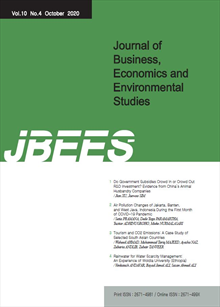간행물
The Journal of Business, Economics, and Environmental Studies KCI 등재

- 발행기관 한국유통과학회
- 자료유형 학술지
- 간기 계간
- ISSN 2671-4981 (Print)2671-499X (Online)
- 수록기간 2011 ~ 2020
- 주제분류 사회과학 > 경영학 사회과학 분류의 다른 간행물
- 십진분류KDC 325DDC 330
권호리스트/논문검색
Vol.4 No.3 (2014년 7월) 4건
1.
2014.07
서비스 종료(열람 제한)
Purpose - This study is aimed at examining Indian consumers’ online shopping motivations, information search, and shopping intentions. The study intends to reveal the relationship between online shopping motivations, information search, and shopping intentions. Research design, data, and methodology - The study employs factor analysis to verify correct loading of items on corresponding factors, and to confirm the applicability of constructs in the Indian context. The model was verified using stepwise regression analysis. Results -The findings show that hedonic and utilitarian motivations significantly affect online information search and shopping intentions. The information search is a significant predictor of online purchase intention. Conclusions - Hedonic and utilitarian motivations are the salient factors affecting online information search and purchase intentions. Marketers are required to design websites that foster an enjoyable online experience. This will attract customers who will browse the website for a longer duration. More time devoted to information search will ensure brand building and loyalty.
2.
2014.07
서비스 종료(열람 제한)
Purpose - This study examines students’ perspectives (stream-wise) of parameters affecting education quality in an affiliated undergraduate engineering institution in NCR, Haryana. Research design, data, and methodology - This study involves descriptive research and data collection using a structured questionnaire based on the Likert scale. The sample comprises 500 student respondents. For data analysis, an f-test was performed using high quality SPSS software. Results - For "Selection" and "Personality Development & Industry Exposure," the analysis of variance revealed a statistical difference between the mean values of the groups. Whereas, for "Academic Excellence," "Infrastructure," "Placements," and "Management & Administration," the analysis of variance revealed no statistical difference between the mean values of the groups. Conclusions - Students’ perceptions about the "Selection" and "Personality Development & Industry Exposure" change according to the various specializations they opt for in their undergraduate engineering education in Haryana. Whereas, for "Academic Excellence," "Infrastructure," "Placements," and "Management & Administration," the perceptions of the students do not vary because of the different specializations they have opted for in their undergraduate engineering education.
3.
2014.07
서비스 종료(열람 제한)
Purpose - This study investigated not only social network service (SNS) characteristics’ effects on continuous use intention and reliability, but also the effects of continuous use intention and reliability on purchase intention. Research design, data, and methodology - The subjects comprised 274 SNS users in their twenties. The research was conducted over three weeks from October 16, 2013 to November 6, 2013, using questionnaires. A total of 267 copies were collected; 255 copies were used after excluding unsuitable copies. Results - Marketers who used SNSs should establish a bi-directional community and SNS page information exchange. SNS marketers should exchange useful information quickly through SNS pages, to differentiate themselves from competitors. Enterprises should use SNSs for marketing, considering not only continuous use intention but also reliability, to elevate product purchase intention. Conclusions - The study had limitations. Most subjects were students aged 24 to 28 years; the findings cannot be generalized. Second, personal computers (PCs) and smartphones had similar influence. Third, the preferences and/or characteristics of each SNS type were not reflected in marketing.
4.
2014.07
서비스 종료(열람 제한)
Purpose - In the past, designs for traditional products have usually focused on historic techniques. However, this tradition of using historic techniques has now been replaced by the trend of using the innovative design concept. Research design, data, and methodology - To measure future market trends and quality requirements, we apply the results of the questionnaires and analyze them with various experimental processes and a design methodology. In this way, we gauge the impact of the innovative product value chain on the promotion of new products. Results - Accompanied with an innovative product value chain, the product can stimulate the development of enterprise management, which has become the main issue in social and economic development in every developed country, and can facilitate the progress of enterprise management throughout the enterprise. Conclusions – Customer demand should be emphasized as the primary means to solve design problems, to design optimal solutions, to create differentiation with competitors, and to pursue optimal marketing strategies

